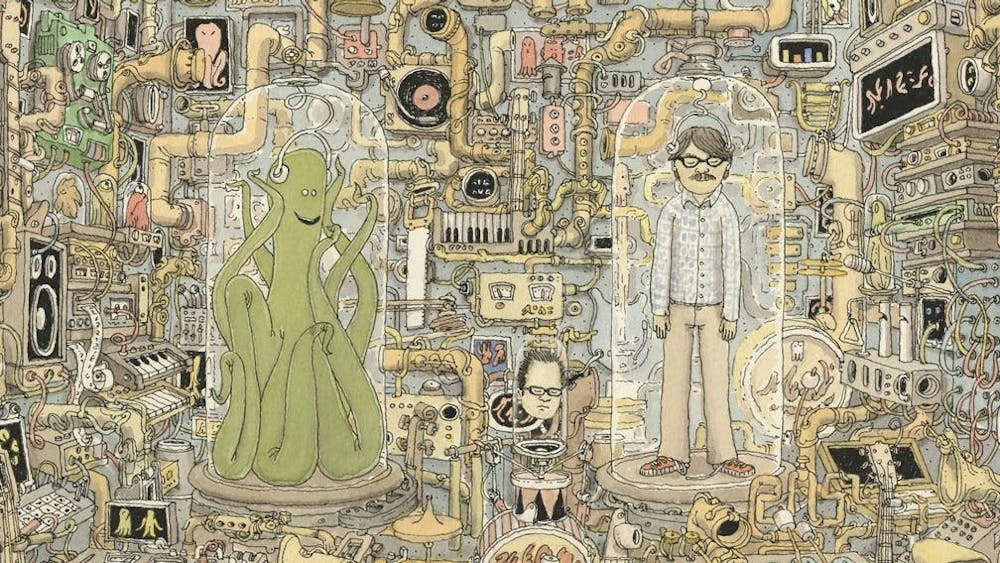Weezer’s music is known for being saturated in satirical nuances. Rivers Cuomo, lead singer, songwriter, and guitarist for the infamous rock band, has the incredible ability to intertwine desolate emotion with an exuberant backbeat and catchy melody. We’ve seen it in the popular hit “Island in the Sun,” a song about running away from the bleakness of reality into an exultant paradise. Again, throughout their 1996 album Pinkerton, Weezer weaves a depressing tale in songs like “Long Time Sunshine” and “Across the Sea” against an electrifying rock beat. OK Human, released on Jan. 29, does just the same; the album is starkly realistic, providing insight into the emotion of isolation during COVID–19, while maintaining an unforgettable instrumental structure.
OK Human, a play on Radiohead’s OK Computer, is wholeheartedly authentic and showcases a new face of Weezer’s music. Cuomo stripped away the many layers of ironic subtleties that typically permeate his lyrical style and created a passionate masterpiece. The emotion and cynicism of this album reflect the reality of being human, as the name bluntly suggests.
The album feels outlandishly straightforward. Throughout the 12 tracks, Weezer emphasizes the emotional and physical toll of being alone, a remarkably relevant topic following the dreadful months of quarantine and lockdown orders. Perhaps this in itself is what makes this album so unforgettable.
The album opens with “All My Favorite Songs,” the preliminary single released on Jan. 21. The song unfolds from a dulcet flute into an orchestral showpiece, with simplistic lyrics that express complex anxieties. Cuomo describes the song as an “opportunity to just sing about whatever I was feeling in the moment, and explore my anxieties.” His lyrical objectives are executed flawlessly. In moments of explicit overthinking, Cuomo sings, “I love parties, but I don’t go / Then I feel bad when I stay home” and “Sometimes I wish I was on an island / But then I’d miss the sound of sirens.”
These paradoxical themes of an internal battle between anxiety and reality introduce references to Simon & Garfunkel’s song “I Am a Rock” and “The Sound of Silence,” as well as Weezer’s own “Island in the Sun.” “All My Favorite Songs” masterfully weaves together the mixed sentiments of being alone: a feeling somewhere between solace and isolation.
The transition between “All My Favorite Songs” and “Aloo Gobi” is effortless. The lyrics describe the mundanities of life: “They say that life gets sweet as years go by / But mine has lost its flavor like this chai.” The song pays homage to an Indian dish that Cuomo would eat often with his wife, an extended metaphor to describe how life was taken for granted prior to lockdown.
This theme continues in “Grapes Of Wrath,” which discusses the simple act of listening to the Steinbeck novel on Audible. Then, on “Playing my Piano,” Cuomo delves into the notion of escapism and how it can become a dangerous game. His complete abandonment of personal responsibility (“I haven’t washed my hair in three weeks / I should get back to these Zoom interviews”) and withdrawal from reality (“Kim Jong–un could blow up my city, I’d never know”) seem ironically realistic. The relevance of these songs, discussing the ways in which isolation can make us feel insignificant, is overtly straightforward compared to previous Weezer albums—drenched in ironic innuendos—and casts a new light on Cuomo’s songwriting.
These elementary ideas that Weezer masterfully utilizes as a disguise for OK Human’s pessimistic core are furthered throughout the album in songs like “Screens” and “Here Comes The Rain.” “Screens” is quite literally about the dissipation of human interaction due to online internet services, unfolding a tale of Cuomo witnessing his daughter sink into a virtual reality. “Here Comes the Rain,” a melancholic play on The Beatles’ “Here Comes the Sun,” has a colorful backbeat with a repetitive chorus discussing mainstream media and internet trolls. Again, Weezer maintains simplicity and unequivocal reality.
Despite most of the album maintaining a positive aura, Weezer dexterously peppers in a few songs that are both heartbreaking and beautiful. A personal favorite on the album is “Bird with a Broken Wing.” This song is so emotionally raw, with Cuomo belting “I still have a song to sing.” The lyrics are both sorrowful and sweet, providing insight into the depths of his insecurities and regrets. “Dead Roses” is another desolate orchestral song about being trapped and alone; “Numbers” is all about self–consciously picking out our own flaws. These topics are dually sensitive and pregnable, executed in a refined rock orchestra.
Weezer’s 14th studio album, OK Human, is a culmination of Cuomo’s songwriting artistry and steadfast fanbase. The album’s raw emotion is unrestricted and free, serving as a preview to Weezer’s 15th studio album Van Weezer which is set to come out later this year. Fans can expect this album to center around heavy guitars and bass, rather than OK Human’s emphasis on orchestral instruments.

